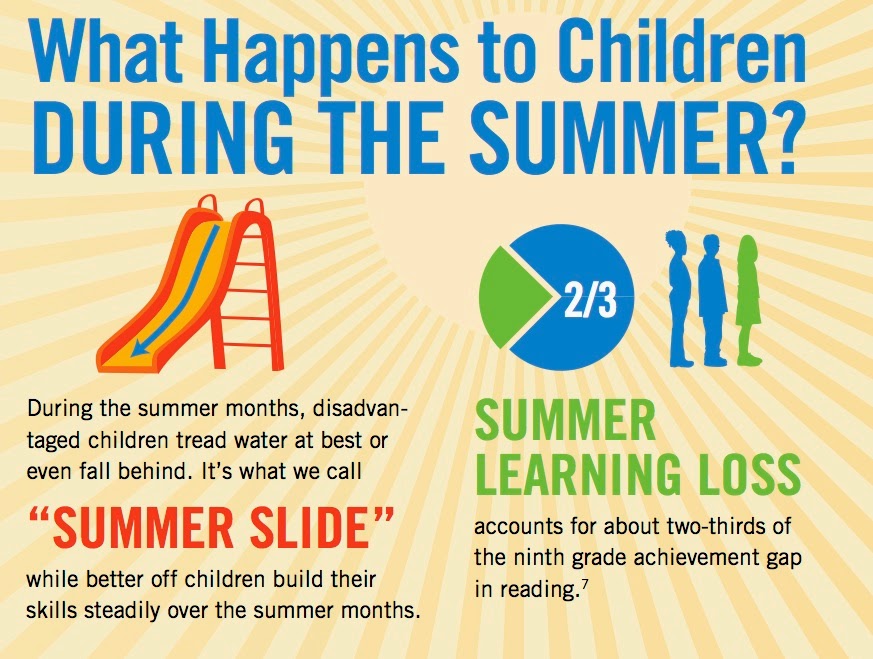You may recall an amusing blog series we posted last summer detailing the important role that summer plays in youth development. Our Executive Director, Maggie Riden, talked about her parents' brilliant creativity in signing her up for a summer theatre camp in the hopes that a new space would motivate her to try and learn to read and end her protracted campaign of summer tutor torture. In the spirit of continuity, we’d like to share with you Part II of that saga:
Fast-forward nearly 10 years. I was 17 and it was the summer after my senior year. I was desperate to save enough money to avoid working my first semester of college. So to compliment my ice cream scooping job at Friendly’s, I signed up with the local elementary schools to work as a summer tutor.
In the weeks leading up to my
first session, I remember diligently tracking down worksheets and lesson plans
from teachers and the library, neatly filing them into a variety of folders. I
recall carefully writing out spelling words and math facts on index cards. What I don’t remember as clearly (but she
loves to mention it) is the look of utter amusement as my Mother watched me. She gently suggested that given the kids I’d
be working with, maybe I should consider a different approach than worksheets
and rote memorization at a desk. She even offered her special education
expertise to help me come up with some ideas. I, with the arrogant certainty
that defines adolescence and early adulthood, scoffed at the suggestion that I
didn’t know what I was doing.
Oh the irony.
Two weeks later I found myself in
one of those amazing life moments when karma catches up with you and not only
smacks you in the face, but laughs with glee while doing so. It was my second or third session with “Kevin”.
I remember sitting at his kitchen table
watching in disbelief as he athletically tossed a massive pile of 3x5 index
cards into the air, launched himself out of his seat, leapt over an
ottoman and then slid with the practiced ease of a baseball player into the
bathroom deftly locking the door behind him.
20 minutes and numerous bribery
offers later, Kevin emerged.
I arrived home frustrated and
embarrassed and attempted to relay the incident to my Mom. Once she had stopped
laughing and regained the ability to speak, we sat down and she helped me come
up with some teaching strategies that were good for him. I can say with
certainty, we never sat at his kitchen table or at his desk again.
For Kevin school was a
frustrating and anxiety filled place. To ask him to replicate that setting with
the added stress of 1:1 attention as he exposed his weaknesses (all while
watching his brother play outside on a lovely summer afternoon) was never going
to work, and it was borderline cruel to expect it to. So we turned his backyard
into a giant clock to teach him how to tell time. We did math fact foot races
with the neighbors. We incentivized reading by celebrating the completion of
each goal with a scavenger hunt based on the theme of the book (he was into nature
and we lived in Vermont which made it fairly easy).
 |
| Info-Graph: National Summer Learning Association |
DC is fortunate. We live in a
city with many organizations and educators that embrace the opportunity of
summer. They are creating spaces that build the skills and academic confidence
of those who may be struggling, and challenge high fliers to aim for even
greater heights.
However, despite improved funding
and increased availability, there are still thousands of children who don’t
have the chance to enjoy the opportunity of summer learning - but would benefit
deeply. So, DCAYA would like to pose two challenges.
First, we need to do a better job
of explaining to all parents the benefits of summer learning programs. We need to be clear that signing up for a
summer program is critical to a child’s academic, social and emotional success.
Second, we must message to
policy makers that we need universal access and a range of programs
that ensure youth can access opportunities that excite them, and provide what
they need as they grow and mature. To achieve that, we must have smart funding and
strong partnerships between schools, community organizations, parks and
recreation and libraries. This must be a priority.
Kevin and I, like many of you,
were lucky. Our parents and teachers got it. They realized early on that we
would need additional support throughout our academic careers and that our
learning styles would require multiple approaches. Many
of which could not occur sitting at a desk. Isn’t that an opportunity we should extend to
all our kids?
Maggie Riden learned spelling words and history facts by setting them to music, recording herself singing them, and then playing them over and over again on a Walkman while jumping on a trampoline. All strategies she credits her Mother, a special educator and multi-modality teaching savant, with coming up with.
For more on youth issues in DC you can FOLLOW us on Twitter, LIKE us on Facebook, SUBSCRIBE to this Blog and VISIT us at www.dc-aya.org


.jpg)
No comments:
Post a Comment